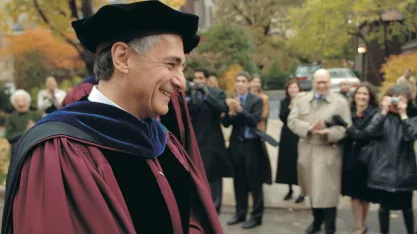Table of Contents
Campus free speech champion Robert Zimmer dies at age 75

(Photo by John Zich)
Former University of Chicago President Robert Zimmer speaks at the Pritzker School of Molecular Engineering at the University of Chicago in 2019.
Robert J. Zimmer, the former president of the University of Chicago who made the school a leader in free speech and academic freedom rights, died yesterday at the age of 75.
“Chancellor Emeritus Zimmer was among the most effective and influential university presidents of his time,” wrote UChicago President Paul Alivisatos and Board Chair David Rubenstein in a message to the campus community. “His tenure will be remembered for his strategic brilliance in bringing about changes for the long-term benefit of the University community.”
Zimmer, who became the 13th president of the University of Chicago in 2006 and served in that role until 2021, was a champion of free expression. “Fundamentally, people are very comfortable with free expression for those that they agree with. And for those that they find disagreeable or wrong, they’re not that eager to have people be able to hear them,” Zimmer said in a 2021 interview shortly before he stepped down as president of the university. “The whole point of education is focused around ongoing intellectual challenge and open discourse.”
FIRE mourns the passing of Robert Zimmer, a stalwart defender of the principles of free expression both on campus and off.
Throughout his tenure as president, Zimmer embodied this value.
In 2014, he appointed the now-famous Committee on Freedom of Expression at the University of Chicago, and the resulting report — commonly known as the “Chicago Statement” or “Chicago Principles” — has since become a model free expression resolution for colleges and universities nationwide.
FIRE endorsed the Chicago Statement soon after its release in 2015 and launched a national campaign to persuade colleges and universities to take proactive steps toward protecting freedom of expression on campus.

Adopting the Chicago Statement
Since 2015, nearly 100 colleges and universities have adopted some version of the Chicago Statement on the principles of free expression.
Since FIRE’s campaign, a version of the Chicago Statement has been adopted by nearly 100 institutions including Princeton University, Purdue University, American University, Columbia University, Georgetown University, and the University of North Carolina at Chapel Hill.
According to FIRE’s research, schools that adopted the Chicago Statement also improved their speech codes — institutional policies that restrict protected student speech — demonstrating that commitment to free expression.
During Zimmer’s tenure, UChicago consistently put its free speech principles into practice. This includes resisting calls to “protect” students from offensive speech, instead trusting their ability to confront complex and difficult concepts with the intellectual rigor for which the institution is renowned.
In his keynote address for the 2021 FIRE Faculty Network Conference, Zimmer said, “We’re in a time of grave challenge for universities worldwide, namely the values of academic freedom, open discourse, free expression, deep questioning, broad intellectual challenge, and independent thought, are under significant attack.”
“Mediocrity is easy,” he continued, “and if mediocrity is the aspiration one can allow some erosion of these values. But excellence should be our aspiration — and excellence is not easy.”

For Zimmer, aiming for excellence meant protecting the right to freely speak, teach, and learn.
[T]he excellence of the research in education at our institutions comes with the price of ensuring that the values of academic freedom, free expression, open discourse, and intellectual challenge are sustained and not eroded, are lived every day and not only when convenient, and are defended when attacked. As we know well from history this is not always simple, and can even become dangerous.
FIRE mourns the passing of Robert Zimmer, a stalwart defender of the principles of free expression both on campus and off. He leaves behind a remarkable legacy that will live on in all people and all institutions that value free speech and academic freedom.
Recent Articles
Get the latest free speech news and analysis from FIRE.

Can the government ban controversial public holiday displays?

The trouble with banning Fizz

FIRE's 2025 impact in court, on campus, and in our culture


